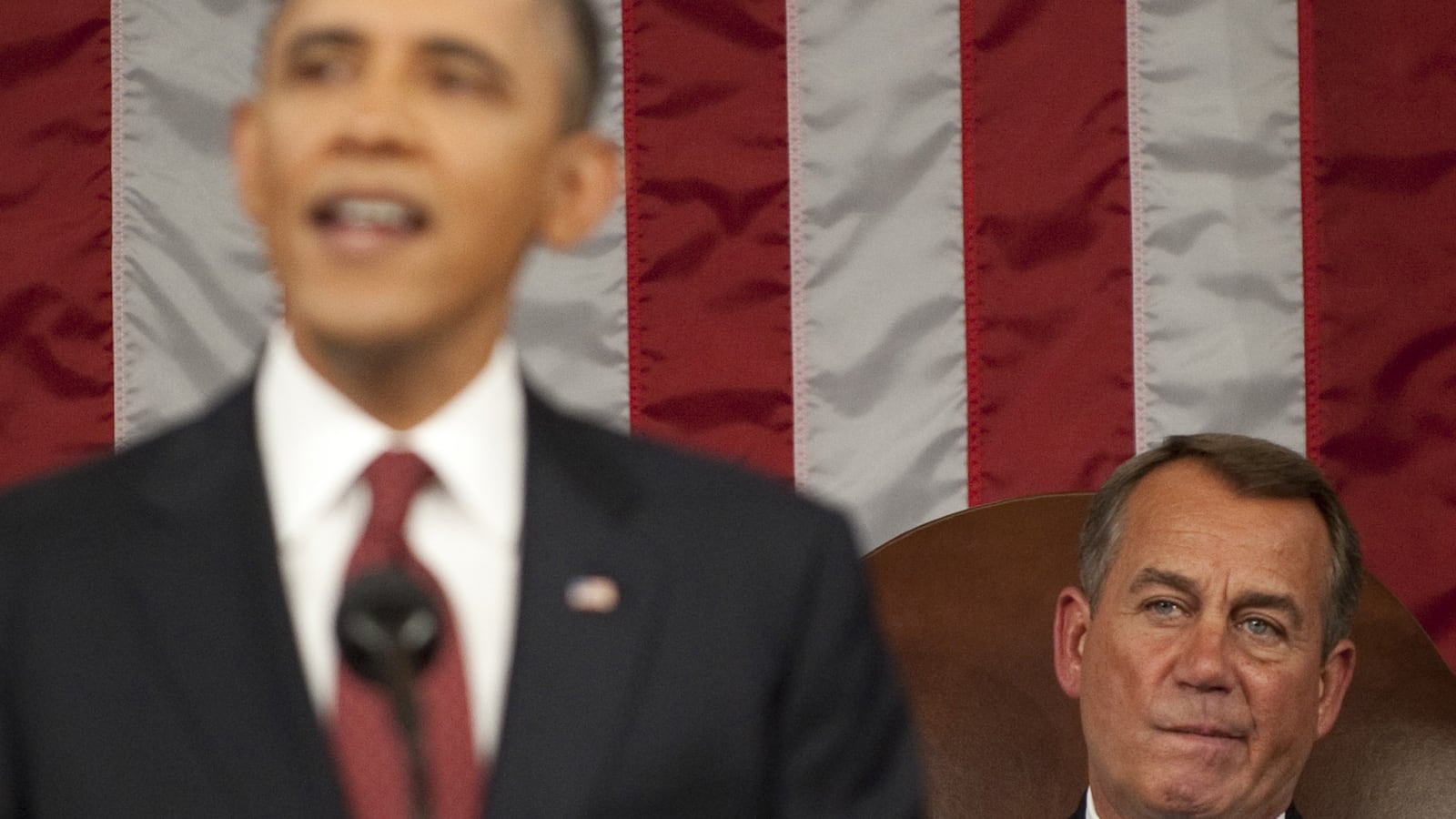Since Speaker John Boehner announced his intention late last month to sue President Obama for overstepping his legal authority, his supporters have frequently noted how few executive orders he’s actually handed down. To date, Obama has only issued 182, while the predecessor he likes to blame for everything issued 291.
But the real issue, of course, is not the number of executive orders issued during one’s presidency but rather their legality. And it’s here that Boehner and company have a real, substantive case against the president.
Obama has issued at least 32 legislative fixes to the Affordable Care Act, softened laws against illegal immigration, and stripped the work requirement from President Clinton’s welfare reform—all with the stroke of his pen. In 2012, perhaps emboldened by the apparent inability of Congress to stop him, Obama declared the United States Senate to be in recess in order to install three nominees on the National Labor Relations Board.
The Supreme Court recently curbed Obama’s ability to circumvent Congress, and now Boehner is readying a lawsuit to do the same. On June 26, 2014, the Supreme Court unanimously ruled that Obama had violated the Constitution by naming those three nominees to the NLRB.
On the same day the Supreme Court invalidated Obama’s recess appointments, he doubled down on his vision of executive authority by flippantly dismissing Boehner’s lawsuit. “So sue me,” the president told reporters when asked about the suit. Fortunately, Boehner has elected to ignore this display of petulance and continue with his landmark attempt to sue the president.
While Obama and his cheerleaders in the media sneer at the notion of executive overreach, noted constitutional scholar and George Washington Law School Professor Jonathan Turley believes Boehner’s suit could prevail. “I think there is a case against the president for exceeding his authority…I happen to agree with the president on many of his priorities and policies, but as I testified in Congress, I think that he has crossed the constitutional line,” Turley told MSNBC the day Boehner announced his suit.
“When the president went to Congress and said he would go it alone, it obviously raises a concern,” Turley added. “There’s no license for going it alone in our system, and what he’s done is very problematic. He has shifted $454 million of the ACA from appropriated purpose to another purpose. He’s told agencies not to enforce some laws, like immigration laws. He has effectively rewritten laws through the active interpretation that I find very problematic. While I happen to agree with him, I voted for him, I think this is a problem.”
While Professor Turley has identified a serious constitutional problem, David Rivkin and Professor Elizabeth Price Foley, the legal masterminds behind the suit, say they believe that the lawsuit has precedent.
They point to a pivotal case brought by five Colorado legislators who sought the ability to challenge a state constitutional amendment in federal court. The case, Kerr v. Hickenlooper, was brought before the 10th Circuit Court of Appeals this year and decided in favor of the legislators and their ability to challenge the legality of the executive branch. This, Rivkin and Foley argue, should worry Obama supporters who scoff at Boehner’s impending legal challenge.
Rivkin and Foley also point to Raines v. Byrd, a 1977 Supreme Court decision. In that ruling, the justices held that a prior case before the high court “stood for the proposition that legislators whose votes would have been sufficient to defeat…a specific legislative act have standing to sue if that legislative action goes into effect (or does not go into effect), on the ground that their votes have been completely nullified.”
Memo to White House Counsel’s Office: Boehner and his colleagues in the House can easily argue that the president’s unilateral rewrite of sections of the Affordable Care Act has essentially nullified the votes cast in the House of Representatives to pass the bill.
“Professor Foley and I believe that, consistent with the existing case law, the House of Representatives would be able to gain standing to challenge a number of President Obama’s unconstitutional suspensions of law, which have nullified the House of Representatives’ legislative authority, thereby inflicting institutional injury on it,” Rivkin told The Daily Beast on Tuesday.
He continued: “A lawsuit challenging anyone of these actions by the President and that meets the other three elements of our four-part test—explicit legislative authorization, no private plaintiff available and no proportionate political ‘self-help’ available—would have an excellent chance of success.”
Boehner will soon submit a resolution to the House of Representatives stating that the president has failed to faithfully execute the law. The Speaker contends that Congress—and by extension the American people—have been harmed by Obama’s unilateral decision to rewrite, ignore or modify laws as he sees fit. And if Obama can act lawlessly and bypass Congress now, the precedent has been set for a Republican president to do the same in future years.
Boehner’s lawsuit is no mere political stunt. Rivkin and Foley have provided a strong legal framework for Boehner to succeed in his lawsuit on the merits. And it will be interesting to see if Obama realizes this and offers a legal defense for unilateral actions, or remains stubbornly dismissive of Boehner and his efforts.






